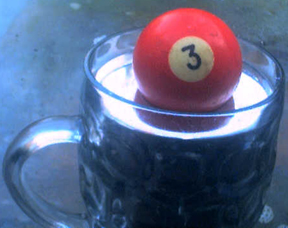This image shows a pool ball floating on liquid mercury. A pool ball is fairly heavy for its size, but you can see it floats on, or is less dense, than liquid mercury.
Click on image for full size
Click on image for full size
Related links:
Density Definition Page
Density is a measure of how much mass is contained in a given unit volume (density = mass/volume). Put simply, if mass is a measure of how much ‘stuff’ there is in an object, density is a measure of how tightly that ‘stuff’ is packed together.
One way to see how density affects things is to look at how things float or sink in water. If something is more dense than water, it will sink, and if it is less dense it will float. This is why an anchor (very dense) sinks, but an inner tube (not very dense) floats.
Last modified September 23, 2002 by Jennifer Bergman.









